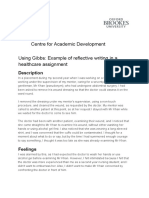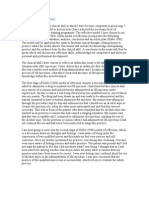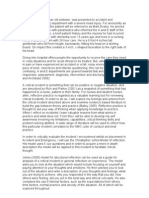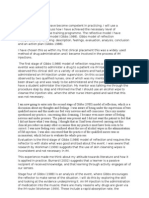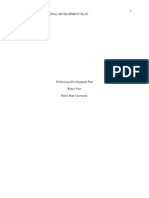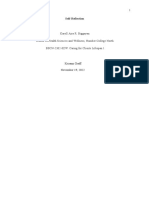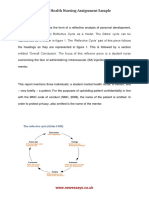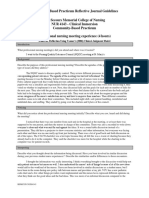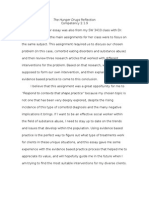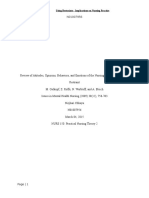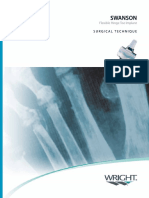Reflective Writing Exercise - Ally 100
Reflective Writing Exercise - Ally 100
Uploaded by
krishCopyright:
Available Formats
Reflective Writing Exercise - Ally 100
Reflective Writing Exercise - Ally 100
Uploaded by
krishOriginal Title
Copyright
Available Formats
Share this document
Did you find this document useful?
Is this content inappropriate?
Copyright:
Available Formats
Reflective Writing Exercise - Ally 100
Reflective Writing Exercise - Ally 100
Uploaded by
krishCopyright:
Available Formats
Reflective writing (Exercise)
These exercises requires you to identify different features of reflective writing.
Answers are presented at the end.
Exercise 1
Identify the sentence that details the main incident being reflected on in this
paragraph.
As part of my project, I undertook secondary research on the rate of teenage
pregnancy among females with care leaver experience. This led me to reflect on the
methods I was using to gather sources and identify that if I was not always getting
my research right then it was possible that other members of the group might also be
misguided in their research strategies. I was surprised at how other members of the
group appeared to automatically trust the content of peer-reviewed journals and I
sometimes felt that what was presented back to the group was generally accepted
as factual as long as there was a reference attached to it. As I questioned the
credibility and ethical practice of research journals, this prompted me to delve more
deeply into what I now realise is referred to as publication bias and has been widely
documented in recent years. Dawes (2005) argued that although reputable journals
adopt a robust peer review process, articles still get published with significant flaws.
It therefore seems that purely reading journal articles that have been identified
through other sources such as journal article bibliographies, may lead to
unrepresentative sources of information being identified and thus unreliable findings.
In the future, I could overcome this issue by specifying where I searched, inputting
keywords when using databases and specify my inclusion criteria in order to conduct
a more rigorous research methodology to select sources to be used in my
dissertation and only select sources that match my search criteria.
Adapted from University of Plymouth (2016)
Reflective writing (Exercise) 1|Page
Exercise 2
Identify where each of the three elements (description, interpretation and
outcome) of reflective writing start and end in this paragraph:
Specific tasks were shared out amongst members of my team. Initially, however, the
tasks were not seen as equally difficult by all team members. Cooperation between
group members was at risk because of this perception of unfairness. Social
interdependence theory recognises a type of group interaction called ‘positive
interdependence’, meaning cooperation (Johnson and Johnson,1993, cited by
Maughan and Webb, 2001). Many studies (Brodie, 2008; Somerville & Keeling,
2004; Revans, 1998) have demonstrated that “cooperative learning experiences
encourage higher achievement” (Maughan and Webb, 2001 p.46). Ultimately, our
group achieved a successful outcome, but to improve the process, we perhaps
needed a chairperson to help encourage cooperation when tasks were being shared
out. Briggs (2005) argues that the role of a chairperson is desirable as it keeps
discussions focused and allows for a fairer distribution of tasks. In future group work,
on the course and at work, I would probably suggest this.
Source: Hampton (2015)
Exercise 3
Read the extract below and identify language used to a) highlight personal
experience; b) show supporting literature; c) suggest future improvement
In a placement during my second year when I was working on a surgical ward, I was
working under the supervision of my mentor, caring for a seventy-two year old
gentleman, Mr Khan (pseudonym), who had undergone abdominal surgery. I
removed the dressing under my mentor's supervision, using a non-touch procedure,
and cleaned the wound, as requested by the doctor. My mentor was called to
another patient at this point, so at her request I stayed with Mr Khan while we waited
Reflective writing (Exercise) 2|Page
for the doctor to come to see him. The doctor had been with other patients,
examining their wounds, and I noticed that she came straight to Mr Khan to examine
his wound, without either washing her hands or using alcohol gel first. I was alarmed
by this. However, I felt intimidated because I felt that the doctor was more
experienced than me and I did not want to embarrass her. Later, I spoke to my
mentor about the incident. She suggested that we speak to the doctor together about
it. My mentor took the doctor aside, and asked her whether she had washed her
hands before examining Mr Khan. She said that she had been very busy and had not
thought about it. My mentor discussed the importance of hand hygiene with her, and
the doctor assured her that she would wash her hands before examining every
patient in the future. The Royal College of Nursing (2005) states that hand hygiene
is the single most important activity for reducing cross-infection, and points out that
many health care professionals do not decontaminate their hands as often as they
should. Recent guidance published by the Department of Health (2007) highlights
the possibility of staff transmitting infections via uniforms, and the need to review
policies on staff dress. The Nursing and Midwifery Council Code of Professional
Conduct (2015, section 3) go further and state that in order to minimise the risk to
patients and clients a nurse must confront poor practices and take the role of
advocate. As the student nurse caring for Mr Khan under my mentor's supervision,
this also applies to my own practice as a student nurse. Looking back on this
incident, I can see that I should have acted sooner, and that I should have ensured
that the doctor washed her hands before examining Mr Khan. I can now see that my
inaction in this incident put Mr Khan's well-being at risk. After discussion with my
mentor, I recognise that I need to develop the confidence to challenge the practice of
colleagues, putting the well-being of clients at the forefront of my mind.
Adapted from: Oxford Brookes University (2018)
Reflective writing (Exercise) 3|Page
Answers
Exercise 1
Main incident sentence: This led me to reflect on the methods I was using to gather
sources and identify that if I was not always getting my research right then it was
possible that other members of the group might also be misguided in their research
strategies.
Notice that the writer only writes about the important incident. It is important that you
avoid writing about events that are irrelevant to the main incident. Focus on how this
experience has changed you as a person /your practice.
Exercise 2
Description: Specific tasks were shared out amongst members of my team.
Interpretation: Initially, however, the tasks were not seen as equally difficult by all
team members. Cooperation between group members was at risk because of this
perception of unfairness. Social interdependence theory recognises a type of group
interaction called ‘positive interdependence’, meaning cooperation (Johnson and
Johnson, 1993, cited by Maughan and Webb, 2001). Many studies (Brodie, 2008;
Somerville & Keeling, 2004; Revans, 1998) have demonstrated that “cooperative
learning experiences encourage higher achievement” (Maughan and Webb, 2001
p.46).
Outcome: Ultimately, our group achieved a successful outcome, but to improve the
process, we perhaps needed a chairperson to help encourage cooperation when
tasks were being shared out. Briggs (2005) argues that the role of a chairperson is
desirable as it keeps discussions focused and allows for a fairer distribution of tasks.
In future group work, on the course and at work, I would probably suggest this.
Reflective writing (Exercise) 4|Page
Notice that the writer wrote more about interpretation and outcome. It is important
that you focus your writing more on these two elements compared to the description.
Exercise 3
Highlight personal experience: In a placement during my second year when I was
working on a surgical ward, I was working under the supervision of my mentor,
caring for a seventy-two year old gentleman, Mr Khan (pseudonym), who had
undergone abdominal surgery. I removed the dressing under my mentor's
supervision, using a non-touch procedure, and cleaned the wound, as requested by
the doctor. My mentor was called to another patient at this point, so at her request I
stayed with Mr Khan while we waited for the doctor to come to see him. The doctor
had been with other patients, examining their wounds, and I noticed that she came
straight to Mr Khan to examine his wound, without either washing her hands or using
alcohol gel first. I was alarmed by this. However, I felt intimidated because I felt that
the doctor was more experienced than me and I did not want to embarrass her.
Later, I spoke to my mentor about the incident. She suggested that we speak to the
doctor together about it.
Show supporting literature: The Royal College of Nursing (2005) states that hand
hygiene is the single most important activity for reducing cross-infection, and points
out that many health care professionals do not decontaminate their hands as
often as they should. Recent guidance published by the Department of Health (2007)
highlights the possibility of staff transmitting infections via uniforms, and the need to
review policies on staff dress. The Nursing and Midwifery Council Code of
Professional Conduct (2015, section 3) go further and state that in order to minimise
the risk to patients and clients a nurse must confront poor practices and take the role
of advocate.
Suggest future improvement: Looking back on this incident, I can see that I should
have acted sooner, and that I should have ensured that the doctor washed her
hands before examining Mr Khan. I can now see that my inaction in this incident put
Reflective writing (Exercise) 5|Page
Mr Khan's well-being at risk. After discussion with my mentor, I recognise that I need
to develop the confidence to challenge the practice of colleagues, putting the well-
being of clients at the forefront of my mind.
Notice that the first person, ‘I’ is used to give details of events and insights. In
reflective writing, a formal writing style is still required. Supporting evidence can be
used to justify why you did something a particular way, why you think you have
encountered a particular problem (like the writer in this extract) or why you might do
something differently next time. It is essential to demonstrate critical analysis as it
allows you to make meaning of the experience you are presenting. In addition, you
will need to check your lecturer on the number of references you should include and
the type of literature you should use e.g., books, journals etc.
References
Department of Health (2007) Uniforms and Workwear: An evidence base for
developing local policy Available at:
http://webarchive.nationalarchives.gov.uk/+/http://www.dh.gov.uk/en/
Publicationsandstatistics/Publications/PublicationsPolicyAndGuidance/DH_078433
(Accessed 16 May 2018)
Hampton, M. (2015) Reflective writing: a basic introduction Available at:
http://www.port.ac.uk/media/contacts-and-departments/student-support-services/
ask/downloads/Reflective-writing---a-basic-intro.pdf (Accessed 8 November 2016).
Nursing and Midwifery Council (2015) The NMC Code for Professional Conduct:
Standards for conduct, Performance and Ethics London: Nursing and Midwifery
Council
Oxford Brookes University (2018) Using Gibbs: Example of reflective writing in a
healthcare assignment Available at: https://www.brookes.ac.uk/students/upgrade/study-
skills/reflective-writing-using-gibbs (Accessed 16 May 2018)
Reflective writing (Exercise) 6|Page
Royal College of Nursing (2005) Good practice in infection prevention and control:
Guidance for nursing staff. London: Royal College of Nursing
The University of Plymouth (2016) Wrasse writing for assignments e-library Available
at: https://wrasse.plymouth.ac.uk/ (Accessed 8 November 2016).
Further information
Study Hub@Library provides a range of opportunities for you to enhance your
academic skills. For more information, visit http://lrweb.beds.ac.uk/studyhub
Reflective writing (Exercise) 7|Page
You might also like
- Gibbs ExampleDocument7 pagesGibbs ExampleAdelaine Dalang-Ano95% (21)
- Using Gibbs Example of Reflective Writing in A Healthcare AssignmentDocument3 pagesUsing Gibbs Example of Reflective Writing in A Healthcare AssignmentM Asif Nawaz100% (3)
- Time Management Reflective LogDocument4 pagesTime Management Reflective Logfazal rahmanNo ratings yet
- Reflection On A Clinical SkillDocument3 pagesReflection On A Clinical Skillekwonna100% (3)
- BSBMED301: Assessment 3: What You Have To DoDocument9 pagesBSBMED301: Assessment 3: What You Have To DoemilyNo ratings yet
- Singlife Cancer Cover Plus PDT Summary - Hospital Reimbursement PlanDocument6 pagesSinglife Cancer Cover Plus PDT Summary - Hospital Reimbursement PlanTulip TyNo ratings yet
- Scenario 2. ReflectionDocument5 pagesScenario 2. ReflectionShafiq Ur Rahman50% (2)
- Ella Reflection Essay - Complete-1Document10 pagesElla Reflection Essay - Complete-1ella grindellNo ratings yet
- Using Gibbs - Example of Reflective Writing in A Healthcare AssignmentDocument3 pagesUsing Gibbs - Example of Reflective Writing in A Healthcare AssignmentNada100% (2)
- Gibbs Reflective Journal SampleDocument4 pagesGibbs Reflective Journal SampleCres Padua Quinzon100% (3)
- Reflective Practice in Nursing - Saw. Final2Document20 pagesReflective Practice in Nursing - Saw. Final2Anonymous HK3LyOqR2g100% (2)
- Discourse CommunityDocument10 pagesDiscourse Communityapi-253794079No ratings yet
- Nicola Bray Reflective PracticeDocument10 pagesNicola Bray Reflective Practicenikkib87100% (3)
- Reflective AssignmentDocument5 pagesReflective AssignmentVictor Murambiwa100% (4)
- Enhancing Communication M LITA 18052979Document7 pagesEnhancing Communication M LITA 18052979Mel MercerNo ratings yet
- DNB QUESTION PAPER-Topic Wise (Author DR - Sirisha)Document92 pagesDNB QUESTION PAPER-Topic Wise (Author DR - Sirisha)Sirisha CkvNo ratings yet
- Gibb's Reflective CycleDocument11 pagesGibb's Reflective CycleLeornard MukuruNo ratings yet
- DocumentbbbDocument4 pagesDocumentbbbMuhammad AamirNo ratings yet
- Reflective SampleDocument2 pagesReflective SamplePrecious DaramolaNo ratings yet
- Clinical Supervision Assignment 1 JournalingDocument10 pagesClinical Supervision Assignment 1 Journalingapi-238869728No ratings yet
- Nur403 IntropagesummaryprojectDocument6 pagesNur403 Intropagesummaryprojectapi-529373199No ratings yet
- Sample 2 GibbsDocument5 pagesSample 2 GibbsAhmed YusufNo ratings yet
- Ethical Dilemmas Essay FinalDocument5 pagesEthical Dilemmas Essay FinalMaxine FomunungNo ratings yet
- Reflective Log 02 DescriptionDocument2 pagesReflective Log 02 DescriptionAamirNo ratings yet
- Nurising Assignment ConflictDocument10 pagesNurising Assignment ConflictLauren KalantaNo ratings yet
- Conflict Resolution PaperDocument13 pagesConflict Resolution Paperapi-285782264No ratings yet
- Reflective JournalDocument8 pagesReflective JournalParveen KumariNo ratings yet
- Transition Into Practice PaperDocument9 pagesTransition Into Practice Paperapi-652914452No ratings yet
- Nursing HandoverDocument7 pagesNursing Handoverpros_86850% (2)
- Running Head: Self-Assessment of Nursing Standards 1Document16 pagesRunning Head: Self-Assessment of Nursing Standards 1api-253788190No ratings yet
- RiverspdpDocument15 pagesRiverspdpapi-241413796No ratings yet
- Karyll Reflection 2Document5 pagesKaryll Reflection 2Karyll BiggayanNo ratings yet
- 17nursing Essay Sample NewessayscoukDocument11 pages17nursing Essay Sample NewessayscoukAyu Cahyani DewiNo ratings yet
- Professional Meeting ReflectionDocument2 pagesProfessional Meeting Reflectionapi-496088094No ratings yet
- Professional Meeting ReflectionDocument3 pagesProfessional Meeting Reflectionapi-402049842No ratings yet
- Nur 460 PGC Reflection PaperDocument14 pagesNur 460 PGC Reflection Paperapi-598192448No ratings yet
- Factors Affecting Nursing Ethics in Nursing Practice at University Hospitals of Tigray Ethiopia 2019 A Qualitative ReseaDocument4 pagesFactors Affecting Nursing Ethics in Nursing Practice at University Hospitals of Tigray Ethiopia 2019 A Qualitative Resea1130019011 ALDILA AYU WIDYANo ratings yet
- Stoessel Ethics Paper 10 17 16Document6 pagesStoessel Ethics Paper 10 17 16api-314521377No ratings yet
- Professional Meeting Reflective Journal IfnalDocument3 pagesProfessional Meeting Reflective Journal Ifnalapi-433144546No ratings yet
- Guide For Reflection Using Tanner's (2006) Clinical Judgment ModelDocument3 pagesGuide For Reflection Using Tanner's (2006) Clinical Judgment Modelapi-430575435No ratings yet
- Week 5 Ethical and Legal ImplicationsDocument5 pagesWeek 5 Ethical and Legal ImplicationsHugsNo ratings yet
- Mental Health Nursing Assignment Sample: WWW - Newessays.co - UkDocument15 pagesMental Health Nursing Assignment Sample: WWW - Newessays.co - UkAriadne MangondatoNo ratings yet
- Reflection On A Night Shift in Emergency and TraumaDocument7 pagesReflection On A Night Shift in Emergency and Traumasjamilmdfauzie100% (1)
- Wharton - Professional Meeting ReflectionDocument3 pagesWharton - Professional Meeting Reflectionapi-456719996No ratings yet
- Clinical Nursing Judgment HassettDocument6 pagesClinical Nursing Judgment Hassettapi-741205985No ratings yet
- Weebly 9Document1 pageWeebly 9api-281551637No ratings yet
- Therapeutic Relationship PatientDocument6 pagesTherapeutic Relationship Patientdamcon7No ratings yet
- Nurs 3021 - Clinical Reflective JournalDocument5 pagesNurs 3021 - Clinical Reflective Journalapi-505854426No ratings yet
- Senior Research Investigation FinalDocument17 pagesSenior Research Investigation Finalapi-440099433No ratings yet
- Guide For Reflection Using Tanner's (2006) Clinical Judgment ModelDocument3 pagesGuide For Reflection Using Tanner's (2006) Clinical Judgment Modelapi-422930874No ratings yet
- Reamer ProfmeetingsreflDocument3 pagesReamer Profmeetingsreflapi-308637479No ratings yet
- Leadership Skills in Nursing - EditedDocument6 pagesLeadership Skills in Nursing - EditedAugustus KiokoNo ratings yet
- Honors Reflection Master 1Document11 pagesHonors Reflection Master 1api-661465000No ratings yet
- 12 B Nurs 403 Therapeutic Nursing Interventions PaperDocument11 pages12 B Nurs 403 Therapeutic Nursing Interventions Paperapi-305128971No ratings yet
- Bsmcon Professional Meeting ReflectionDocument2 pagesBsmcon Professional Meeting Reflectionapi-428103455No ratings yet
- Margareth Newman'sDocument4 pagesMargareth Newman'swilmanurilla17No ratings yet
- Gibbs Reflective Journaling (2) (1)Document7 pagesGibbs Reflective Journaling (2) (1)viasiplao09No ratings yet
- And The Foundation of Life. The Author, Dr. Robert Becker, Is Both An OrthopedicDocument4 pagesAnd The Foundation of Life. The Author, Dr. Robert Becker, Is Both An OrthopedicAbigael GuntherNo ratings yet
- A Close Encounter: Orlando's Dynamic Nurse-Patient RelationshipDocument8 pagesA Close Encounter: Orlando's Dynamic Nurse-Patient Relationshipana2323No ratings yet
- Using Restraints - Implications On Nursing Practice - FinalDocument7 pagesUsing Restraints - Implications On Nursing Practice - Finalapi-314561050No ratings yet
- Critical-Care Nurses’ Perceived Leadership Practices, Organizational Commitment, and Job Satisfaction: An Empirical Analysis of a Non-Profit HealthcareFrom EverandCritical-Care Nurses’ Perceived Leadership Practices, Organizational Commitment, and Job Satisfaction: An Empirical Analysis of a Non-Profit HealthcareNo ratings yet
- Critical WritingDocument5 pagesCritical WritingkrishNo ratings yet
- 4 CE7Document7 pages4 CE7krishNo ratings yet
- Brand: Floating and Trunnion Mounted Ball Valves Soft and Metal Seated ASME CLASS 15O 2500Document52 pagesBrand: Floating and Trunnion Mounted Ball Valves Soft and Metal Seated ASME CLASS 15O 2500krishNo ratings yet
- Round Tapered Fluted Steel FL210: SpecificationsDocument2 pagesRound Tapered Fluted Steel FL210: SpecificationskrishNo ratings yet
- SP - C - 1634-00002-Tender Circular No.01-Pre Bid Minutes of Meeting PDFDocument3 pagesSP - C - 1634-00002-Tender Circular No.01-Pre Bid Minutes of Meeting PDFkrishNo ratings yet
- Operations Record General Surgery (2016 - 2017) First YearDocument2 pagesOperations Record General Surgery (2016 - 2017) First YeartameemNo ratings yet
- Etiquette and Professional MannersDocument12 pagesEtiquette and Professional MannersMaher ShabanNo ratings yet
- Swanson Toe ReplacementDocument19 pagesSwanson Toe ReplacementJacob DoughertyNo ratings yet
- PDF PRACTICAL MANUAL OF MINIMALLY INVASIVE GYNECOLOGIC AND ROBOTIC SURGERY: A Clinical Cook Book 3e 3rd Edition Resad Paya Pasic DownloadDocument62 pagesPDF PRACTICAL MANUAL OF MINIMALLY INVASIVE GYNECOLOGIC AND ROBOTIC SURGERY: A Clinical Cook Book 3e 3rd Edition Resad Paya Pasic Downloadtijusherty9100% (2)
- Dangers of Plastic Surgery.Document3 pagesDangers of Plastic Surgery.Ivan ObagaNo ratings yet
- Asrs 2018 Mastering Retina Coding Joy WoodkeDocument79 pagesAsrs 2018 Mastering Retina Coding Joy Woodkeapi-405859281No ratings yet
- Angol Nyelvű Önéletrajz Minták Szerkeszthető Word SablonokDocument22 pagesAngol Nyelvű Önéletrajz Minták Szerkeszthető Word SablonokMarika Tasi-VorákNo ratings yet
- Scrub and Circulating Practitioner Simulation Script - Salimbagat, UsmanDocument12 pagesScrub and Circulating Practitioner Simulation Script - Salimbagat, UsmanChristine Pialan SalimbagatNo ratings yet
- ISWCAP 19th June 2021 Dr. Chew Khong Yik Final v2Document70 pagesISWCAP 19th June 2021 Dr. Chew Khong Yik Final v2Tiến Đạt Nguyễn KiềuNo ratings yet
- Improving Growth of Infants With Congenital Heart Disease Using A Consensus-Based Nutritional PathwayDocument8 pagesImproving Growth of Infants With Congenital Heart Disease Using A Consensus-Based Nutritional Pathwaybela siskaNo ratings yet
- Intra Op CombinedDocument62 pagesIntra Op CombinedJan Federick Bantay100% (2)
- Literature Rev. UchexDocument9 pagesLiterature Rev. Uchexuchennaobidike22No ratings yet
- AppendicitisDocument7 pagesAppendicitisTim LuoNo ratings yet
- The Art of Threads A Comprehensive ReviewDocument17 pagesThe Art of Threads A Comprehensive Reviewalejandro Gonzàlez80% (5)
- Continue: Stallard's Eye Surgery PDFDocument3 pagesContinue: Stallard's Eye Surgery PDFCod Mobile100% (1)
- Curriculum Vitae - Rolanda Willacy, MDDocument8 pagesCurriculum Vitae - Rolanda Willacy, MDRolanda WillacyNo ratings yet
- Revisional Asian Blepharoplasty of The High Eyelid Fold - Tarsus-Orbicularis Fixation Combined With Orbital Fat Repositioning TechniqueDocument5 pagesRevisional Asian Blepharoplasty of The High Eyelid Fold - Tarsus-Orbicularis Fixation Combined With Orbital Fat Repositioning TechniqueRaul FonsecaNo ratings yet
- Cardiac Surgery in The Adult - 24-41Document18 pagesCardiac Surgery in The Adult - 24-41Nicola AlkhorayNo ratings yet
- DMO Resum-GouthamDocument4 pagesDMO Resum-Gouthamnanigoutham003No ratings yet
- Semarang Digestive Week 6Document12 pagesSemarang Digestive Week 6Antonio PaulusNo ratings yet
- GAPDocument14 pagesGAPNidhi VijanNo ratings yet
- Managing Cataract Surgery in Patients With GlaucomaDocument3 pagesManaging Cataract Surgery in Patients With Glaucomanovianti alfinaNo ratings yet
- Complete Oxford Handbook of Surgical Nursing First Edition Kisiel PDF For All ChaptersDocument62 pagesComplete Oxford Handbook of Surgical Nursing First Edition Kisiel PDF For All Chapterslejowaklider100% (4)
- Board Exam 3Document26 pagesBoard Exam 3Kira100% (1)
- Post ERCP Duodenal Perforation PDFDocument39 pagesPost ERCP Duodenal Perforation PDFTomus Claudiu100% (1)
- Pre & Post Operative TracheostomyDocument2 pagesPre & Post Operative TracheostomyHantu Kak Limah100% (2)
- Best Practices For Perioperative Nursing Care For WeightDocument19 pagesBest Practices For Perioperative Nursing Care For WeightDessy TrisariNo ratings yet


